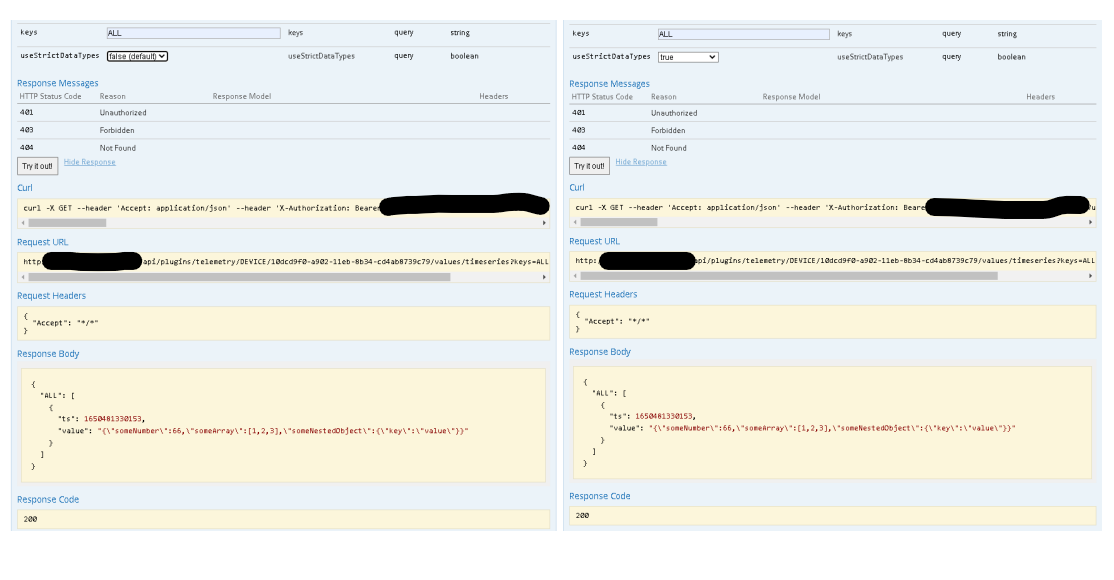ThingsBoard is an open-source IoT platform for data collection, processing, visualization, and device management. This project is a Python library that provides convenient client SDK for both Device and Gateway APIs.
SDK supports:
- Unencrypted and encrypted (TLS v1.2) connection
- QoS 0 and 1 (MQTT only)
- Automatic reconnect
- All Device MQTT APIs provided by ThingsBoard
- All Gateway MQTT APIs provided by ThingsBoard
- Most Device HTTP APIs provided by ThingsBoard
- Device Claiming
- Firmware updates
The Device MQTT API and the Gateway MQTT API are base on the Paho MQTT library. The Device HTTP API is based on the Requests library.
To install using pip:
pip3 install tb-mqtt-clientClient initialization and telemetry publishing
from tb_device_mqtt import TBDeviceMqttClient, TBPublishInfo
telemetry = {"temperature": 41.9, "enabled": False, "currentFirmwareVersion": "v1.2.2"}
# Initialize ThingsBoard client
client = TBDeviceMqttClient("127.0.0.1", username="A1_TEST_TOKEN")
# Connect to ThingsBoard
client.connect()
# Sending telemetry without checking the delivery status
client.send_telemetry(telemetry)
# Sending telemetry and checking the delivery status (QoS = 1 by default)
result = client.send_telemetry(telemetry)
# get is a blocking call that awaits delivery status
success = result.get() == TBPublishInfo.TB_ERR_SUCCESS
# Disconnect from ThingsBoard
client.disconnect()TLS connection to localhost. See https://thingsboard.io/docs/user-guide/mqtt-over-ssl/ for more information about client and ThingsBoard configuration.
from tb_device_mqtt import TBDeviceMqttClient
import socket
client = TBDeviceMqttClient(socket.gethostname())
client.connect(tls=True,
ca_certs="mqttserver.pub.pem",
cert_file="mqttclient.nopass.pem")
client.disconnect()from tb_device_http import TBHTTPDevice
client = TBHTTPDevice('https://thingsboard.example.com', 'secret-token')
client.connect()
client.send_telemetry({'temperature': 41.9})TBDeviceMqttClient provides access to Device MQTT APIs of ThingsBoard platform. It allows to publish telemetry and attribute updates, subscribe to attribute changes, send and receive RPC commands, etc. Use TBHTTPClient for the Device HTTP API.
You can subscribe to attribute updates from the server. The following example demonstrates how to subscribe to attribute updates from the server.
import time
from tb_device_mqtt import TBDeviceMqttClient
def on_attributes_change(client, result, exception):
if exception is not None:
print("Exception: " + str(exception))
else:
print(result)
client = TBDeviceMqttClient("127.0.0.1", username="A1_TEST_TOKEN")
client.connect()
client.subscribe_to_attribute("uploadFrequency", on_attributes_change)
client.subscribe_to_all_attributes(on_attributes_change)
while True:
time.sleep(1)Note: The HTTP API only allows a subscription to updates for all attribute.
from tb_device_http import TBHTTPClient
client = TBHTTPClient('https://thingsboard.example.com', 'secret-token')
def callback(data):
print(data)
# ...
# Subscribe
client.subscribe('attributes', callback)
# Unsubscribe
client.unsubscribe('attributes')You can send multiple telemetry messages at once. The following example demonstrates how to send multiple telemetry messages at once.
from tb_device_mqtt import TBDeviceMqttClient, TBPublishInfo
import time
telemetry_with_ts = {"ts": int(round(time.time() * 1000)), "values": {"temperature": 42.1, "humidity": 70}}
client = TBDeviceMqttClient("127.0.0.1", username="A1_TEST_TOKEN")
# we set maximum amount of messages sent to send them at the same time. it may stress memory but increases performance
client.max_inflight_messages_set(100)
client.connect()
results = []
result = True
for i in range(0, 100):
results.append(client.send_telemetry(telemetry_with_ts))
for tmp_result in results:
result &= tmp_result.get() == TBPublishInfo.TB_ERR_SUCCESS
print("Result " + str(result))
client.disconnect()Unsupported, the HTTP API does not allow the packing of values.
You can request attributes from the server. The following example demonstrates how to request attributes from the server.
import time
from tb_device_mqtt import TBDeviceMqttClient
def on_attributes_change(client,result, exception):
if exception is not None:
print("Exception: " + str(exception))
else:
print(result)
client = TBDeviceMqttClient("127.0.0.1", username="A1_TEST_TOKEN")
client.connect()
client.request_attributes(["configuration","targetFirmwareVersion"], callback=on_attributes_change)
while True:
time.sleep(1)from tb_device_http import TBHTTPClient
client = TBHTTPClient('https://thingsboard.example.com', 'secret-token')
client_keys = ['attr1', 'attr2']
shared_keys = ['shared1', 'shared2']
data = client.request_attributes(client_keys=client_keys, shared_keys=shared_keys)You can respond to RPC calls from the server. The following example demonstrates how to respond to RPC calls from the server. Please install psutil using 'pip install psutil' command before running the example.
try:
import psutil
except ImportError:
print("Please install psutil using 'pip install psutil' command")
exit(1)
import time
import logging
from tb_device_mqtt import TBDeviceMqttClient
# dependently of request method we send different data back
def on_server_side_rpc_request(client, request_id, request_body):
print(request_id, request_body)
if request_body["method"] == "getCPULoad":
client.send_rpc_reply(request_id, {"CPU percent": psutil.cpu_percent()})
elif request_body["method"] == "getMemoryUsage":
client.send_rpc_reply(request_id, {"Memory": psutil.virtual_memory().percent})
client = TBDeviceMqttClient("127.0.0.1", username="A1_TEST_TOKEN")
client.set_server_side_rpc_request_handler(on_server_side_rpc_request)
client.connect()
while True:
time.sleep(1)You can use HTTP API client in case you want to use HTTP API instead of MQTT API.
from tb_device_http import TBHTTPClient
client = TBHTTPClient('https://thingsboard.example.com', 'secret-token')
def callback(data):
rpc_id = data['id']
# ... do something with data['params'] and data['method']...
response_params = {'result': 1}
client.send_rpc(name='rpc_response', rpc_id=rpc_id, params=response_params)
# Subscribe
client.subscribe('rpc', callback)
# Unsubscribe
client.unsubscribe('rpc')TBGatewayMqttClient extends TBDeviceMqttClient, thus has access to all it's APIs as a regular device. Besides, gateway is able to represent multiple devices connected to it. For example, sending telemetry or attributes on behalf of other, constrained, device. See more info about the gateway here:
import time
from tb_gateway_mqtt import TBGatewayMqttClient
gateway = TBGatewayMqttClient("127.0.0.1", username="TEST_GATEWAY_TOKEN")
gateway.connect()
gateway.gw_connect_device("Test Device A1")
gateway.gw_send_telemetry("Test Device A1", {"ts": int(round(time.time() * 1000)), "values": {"temperature": 42.2}})
gateway.gw_send_attributes("Test Device A1", {"firmwareVersion": "2.3.1"})
gateway.gw_disconnect_device("Test Device A1")
gateway.disconnect()You can request attributes from the server. The following example demonstrates how to request attributes from the server.
import time
from tb_gateway_mqtt import TBGatewayMqttClient
def callback(result, exception):
if exception is not None:
print("Exception: " + str(exception))
else:
print(result)
gateway = TBGatewayMqttClient("127.0.0.1", username="TEST_GATEWAY_TOKEN")
gateway.connect()
gateway.gw_request_shared_attributes("Test Device A1", ["temperature"], callback)
while True:
time.sleep(1)You can respond to RPC calls from the server. The following example demonstrates how to respond to RPC calls from the server. Please install psutil using 'pip install psutil' command before running the example.
import time
from tb_gateway_mqtt import TBGatewayMqttClient
try:
import psutil
except ImportError:
print("Please install psutil using 'pip install psutil' command")
exit(1)
def rpc_request_response(client, request_id, request_body):
# request body contains id, method and other parameters
print(request_body)
method = request_body["data"]["method"]
device = request_body["device"]
req_id = request_body["data"]["id"]
# dependently of request method we send different data back
if method == 'getCPULoad':
gateway.gw_send_rpc_reply(device, req_id, {"CPU load": psutil.cpu_percent()})
elif method == 'getMemoryLoad':
gateway.gw_send_rpc_reply(device, req_id, {"Memory": psutil.virtual_memory().percent})
else:
print('Unknown method: ' + method)
gateway = TBGatewayMqttClient("127.0.0.1", username="TEST_GATEWAY_TOKEN")
gateway.connect()
# now rpc_request_response will process rpc requests from servers
gateway.gw_set_server_side_rpc_request_handler(rpc_request_response)
# without device connection it is impossible to get any messages
gateway.gw_connect_device("Test Device A1")
while True:
time.sleep(1)There are more examples for both device and gateway in corresponding folders.
This project is released under Apache 2.0 License.







